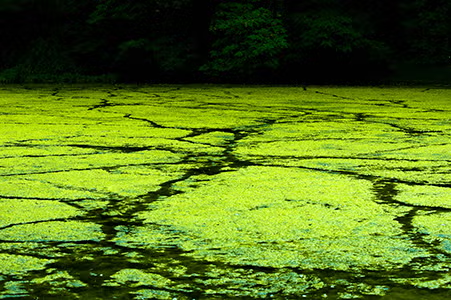Sustainability Challenge:
Consumers are seeking access to dependable, affordable, more renewable energy resources.
Chemistry Solution:
Technology innovations developed by ExxonMobil can transform algae into clean, renewable, low-carbon energy.
Sustainability Benefit:
Algae-based fuels emit fewer greenhouse gases than most conventional energy sources, and, because it absorbs carbon dioxide, algae fuel can help reduce atmospheric GHG levels.
Global demand for transportation-related energy is projected to increase by 25 percent through 2040, so lowering emissions from this sector is critical to reducing greenhouse gas emissions. Research into lower-emission, bio-based algae fuel technologies has been growing over the past decade.

Through the process of photosynthesis, algae transforms carbon dioxide and sunlight into energy and store it in the form of oil. As energy specialists seek to deploy algae-based biofuels, they have been challenged to generate large enough amounts of the raw material from algae to make its production cost effective.
To address this issue, scientists from ExxonMobil and Synthetic Genomics, Inc. used advanced cell engineering to develop a strain of algae that can convert carbon into double the amount of energy-rich oil, which can serve as feedstock for low-emission transportation fuels.
Increasing the oil content of algae will be a major step in turning algae into a commercially viable energy source. ExxonMobil anticipates that this technology could enable production of 10,000 barrels of algae biofuel each day by 2025.
Algae-based fuels feature a range of sustainability benefits – the fuel itself emits fewer greenhouse gases than most conventional energy sources. In addition, because algae absorbs carbon dioxide, a major component of greenhouse gases, the algae-based biofuel production process itself can help reduce greenhouse gas levels in the atmosphere.
Furthermore, industrial-scale algae production is less likely to stress food production – algae can grow in saltwater, freshwater or contaminated water, at sea or in ponds, and on land not suitable for farming.



